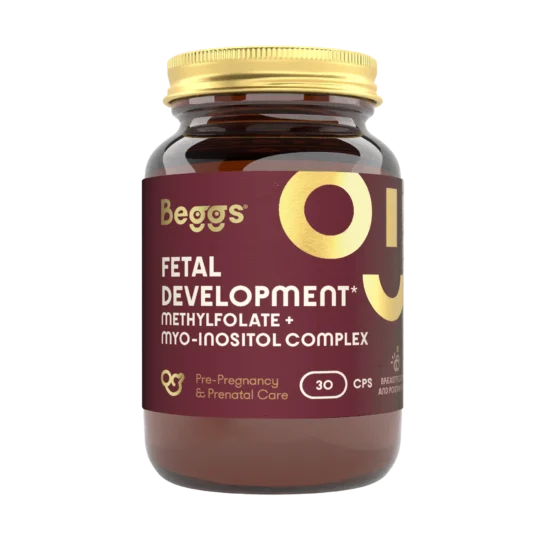Folic acid is essential for body functions that require cell division. It is particularly important for the normal development of the baby and in the formation of key substances for the nervous system. That is why doctors recommend it to expectant mothers. However, folic acid has a much wider application. Its inclusion in the daily routine offers a number of lifelong benefits for every woman.
A “green nutrient” with many functions
Folic acid is a water-soluble vitamin B9, sometimes called folacin or folate. It was discovered in 1940 by extraction from spinach1. The body cannot store it for too long, so it must be replenished daily. It is found naturally in dark green leafy vegetables, beans, peas, nuts, oranges, lemons, bananas, watermelons or strawberries. If these raw materials are heat-treated or improperly stored, they lose up to 50% of the folic acid contained in them. Its sufficient dose can be ensured by means of supplements as additions to a varied diet.
Folic acid helps your body:
- to make and repair DNA
- to build muscles
- to heal wounds
- to prevent birth defects of the spinal cord and brain (neural tube defects)
- to make red blood cells
- to reduce the risk of some types of cancer
- to alleviate emotional discomfort and depression
- to reduce the risk of developing heart diseases and vascular and cerebrovascular events
- to keep nails, hair and skin in optimal condition
Do you know that… folic acid helps to prevent serious birth defects of the brain and spine of the fetus by up to 70%2?
Prevention of birth defects and complications related to pregnancy
Folic acid protects unborn babies from neural tube defects. These birth defects affect the spine, spinal cord or brain and can cause death. They occur in the first weeks of pregnancy, often before a woman knows she is pregnant.
The most common defect is spina bifida. This condition occurs when an unborn baby’s spine does not close completely during development in the womb, leaving the spinal cord exposed. As a result, the nerves that control the legs and other organs do not work. Children with spina bifida often have lifelong disabilities.
The most serious birth defect is anencephaly. The baby is born without part of the skull and brain and eventually dies.
Folic acid also helps to prevent other types of birth defects and pregnancy loss. Considering that approximately 50% of pregnancies are unplanned3, experts recommend the consumption of folic acid to all women, including those who do not want to start a family.
Avoid folate deficiency anemia
Inadequate intake of folic acid can lead to folate deficiency anemia, which is manifested by the following symptoms:
- headache
- fatigue
- digestive problems
- rapid breathing or shortness of breath
- pale skin
- pain in the mouth and on the tongue
- diarrhea
- problems with memory
If you register these symptoms, see a doctor as soon as possible. Late diagnosis and treatment can lead to permanent health damage.
Do you know that… folic acid deficiency anemia is more common in women than men?
Support the brain and improve emotional comfort
Folic acid is crucial for proper brain function and plays an important role in mental and emotional health. Its insufficient level leads to worsening of brain fog symptoms, including difficulty with concentration and memory4.
Studies5 also show that taking supplements of folic acid:
- improve brain performance
- reduce the risk of memory loss and help treat Alzheimer’s disease
- reduce symptoms of anxiety and depression
Do you know that… folic acid supports the production of serotonin, which is important for mood regulation?
Strengthen the heart and blood vessels
Folic acid helps to prevent heart disease, optimizes blood pressure and improves blood flow. Studies show that folic acid supplementation can lead to a 4% reduction in overall heart disease risk and a 10% reduction in stroke risk6.
Highlight your natural beauty
Folic acid is primarily responsible for proper cell growth. It boasts an impressive list of benefits:
- Hair growth. Nourishes hair follicles, stimulates hair growth and keeps them in good condition.
- Hair color. It helps to maintain the natural color of the hair and slows down its graying.
- Nail growth. It supports the growth of nails and improves their strength.
- Skin nutrition. It gives the skin a radiant and youthful appearance.
Stay fit during and after menopause
Women also need folic acid during menopause. It lowers the level of homocysteine, reduces the intensity and frequency of hot flushes and sweating, has a beneficial effect on the bones and balances the mood. In addition to the above benefits, it reduces the risk of cervical cancer and colon cancer. It also helps to prevent type 2 diabetes and rheumatoid arthritis.
Do you know that… the normal daily allowance of folic acid is 200 micrograms per day? During the pregnancy and breastfeeding, intake can be increased to 400 to 600 micrograms.
Resources:
1. https://www.jstor.org/stable/48508236
2. https://www.pregnancybirthbaby.org.au/neural-tube-defect
3. https://www.unfpa.org/press/nearly-half-all-pregnancies-are-unintended-global-crisis-says-new-unfpa-report
4. https://www.healthline.com/nutrition/vitamins-for-brain-fog
5. https://www.ncbi.nlm.nih.gov/pmc/articles/PMC1123448/
6. https://www.ncbi.nlm.nih.gov/pmc/articles/PMC5015297/





